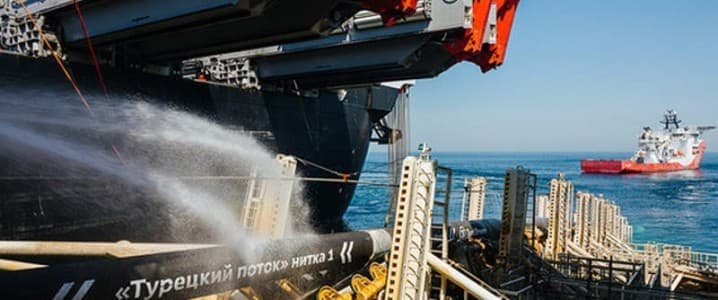Turkish Energy Benefits from Global Upheaval | OilPrice.com
Three years ago, Russia’s President Vladimir Putin floated the idea of creating a European gas hub in Turkey shortly after three leaks were discovered in Nord Stream 1 and 2 pipelines designed to ship natural gas to Germany. Not surprisingly, Turkey expressed a willingness to play along, “It is the first time we heard of the issue of supplying Europe through alternate routes, mentioned by President Putin in his speech. Therefore, it is too early to make an assessment. These kinds of international projects need feasibility assessments…commercial aspects need to be discussed. These are things that need to be discussed,’’ Turkish Energy Minister Fatih Donmez said.
Since then, Putin’s idea has gained considerable traction. Turkey is one of the world’s leading energy consumers–despite being poorly endowed in natural resources–depending on Russia and neighbors like Iraq and Iran to meet its energy needs. Quite naturally, this situation creates vulnerabilities for Turkey. To strengthen Ankara’s hand, Turkish President Recep Tayyip Erdo?an has been trying to position Turkey as an energy hub, connecting natural gas producers to its east and south with markets to the west. The country’s strategic geographical position and infrastructure give it an advantage in this regard.
Related: Crude Oil Inventories See Larger Than Expected Drop
Last year, Turkey announced that it was prepared to significantly increase natural gas exports to the European Union, desperate to further wean itself off Russian gas. In order to do that, the most likely route is to re-export Azeri natural gas from Turkey. That, in turn, would require Turkey to take in more Russian gas to make up for the shortfall. Ankara is keen to play the role of savior and boost its leverage with respect to Brussels, but it wants some demand guarantees before it starts spending on the necessary infrastructure. The Trans-Anatolian Natural Gas Pipeline, which forms part of the Southern Gas Corridor bringing Azerbaijani gas to Europe, is a strategic advantage for Turkey. The country is also home to five LNG terminals, seven gas pipelines, three floating storage units, and two underground storage facilities, as well as considerable excess import capacity that could be used for trading.
In terms of reducing the amount of natural gas revenue for Moscow’s war coffers, then, it’s a wash. Money spent by the EU on Russian natural gas would simply be shifted to Turkey, but the revenue for Russia remains the same, more or less.
Meanwhile, over the past couple of years, Europe has been trying to secure alternative gas supplies to replace Russian gas transiting through Ukraine. Russian gas stopped flowing to EU states via Ukraine after a five-year deal expired on January 1 2025, marking the end of a decades-long arrangement. Ukrainian President Volodymyr Zelensky declared that his country would not allow Russia to “earn additional billions on our blood”, with a cross-section of leaders describing it as yet”another victory” against Moscow.
The European Commission said the EU had prepared for the change and most states could cope. Moldova, which is not in the EU, is already suffering shortages. Russia can still send gas to Hungary, Turkey and Serbia through the TurkStream pipeline across the Black Sea. Azerbaijan’s natural gas sold to Turkey could be re-exported to Europe, possibly through Bulgaria, but not without effort and expense. In an interview with Bloomberg, Turkish Energy Minister Alparslan Bayraktar pushed hard for a Bulgaria route, noting a potential for increasing volumes to the EU up to 10 billion cubic meters per year, while sending a clear message to Brussels: It won’t happen without some demand guarantees.
According to Bayraktar, the capacity to export via Bulgaria right now is only around 3.5 billion cubic meters a year. But “from a technical point of view”, Turkey is capable of boosting this interconnection.
“What we need is an increase in the capacity of the interconnection between Turkey and Bulgaria”, which currently can only receive about half of the amount of seven billion cubic meters per year that, from a technical point of view, Turkey can provide it,” Bayraktar told Bloomberg.
Turkey and Bulgaria signed a deal in 2023 to permit Bulgaria’s state-owned Bulgargaz to import 1.85 billion cubic meters of gas per year– good for ~60% of Bulgaria’s annual demand–through the Strandzha-Malkoclar interconnection border point with Turkey. Bulgargaz has to pay a €2 billion service fee to Turkish gas firm Bota? over a 13-year period, regardless of whether it makes use of this capacity.
The ball is now in Brussels’ court, and the clock is ticking on ways to replace gas transiting through Ukraine. According to Rystad Energy, Europe will need another 7.2 bcm annually of more expensive liquefied natural gas (LNG) to make up for this shortfall, and Ankara appears to hold all of the cards.
Turkey’s ambitions to become a leading energy hub in Europe also gathered momentum after the sudden collapse of the 54-year Assad dynasty in Syria. Turkish companies are well-placed to secure major contracts should Syria transform into a free market, with the cost of reconstruction estimated at $400 billion. Turkey could construct a gas pipeline to the west of Syria and connect to the Arab Gas Pipeline network (which links Syria, Jordan, and Egypt). This would help Turkey to offer regional gas producers such as Israel and Egypt a more commercially viable route to European markets compared to current LNG alternatives.
By Alex Kimani fo Oilprice.com
More Top Reads From Oilprice.com


